|
|
|
Sort Order |
|
|
|
Items / Page
|
|
|
|
|
|
|
| Srl | Item |
| 1 |
ID:
124252
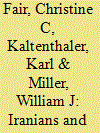

|
|
|
|
|
| Publication |
2013.
|
| Summary/Abstract |
A 2008 poll of Iranians revealed that approximately twenty-four percent of those surveyed support the development nuclear weapons by Iran, while seventy-four percent of those surveyed support the development of exclusively peaceful nuclear capabilities. This essay develops an argument that explains why Iranians hold different views on nuclear weapons. We contend that the elite discourse on the legitimacy of nuclear weapons within a nation will play a very large role in shaping public attitudes on the development of such weapons. In post-revolution Iran, ruling elites have invoked Islam to shape the discourse on nuclear weapons, and top clerics have argued that Islam forbids the development of such weapons. Thus we would expect that acceptance or rejection of this view of nuclear weapons will be the primary factor explaining an Iranian's support for or opposition to their development. Our regression analyses indicate that a respondent's views on whether Islam tolerates the development of nuclear weapons explain, in large measure, the observed variation in Iranian support for developing nuclear weapons.
|
|
|
|
|
|
|
|
|
|
|
|
|
|
|
|
| 2 |
ID:
116429


|
|
|
| 3 |
ID:
110637
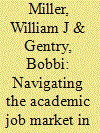

|
|
|
|
|
| Publication |
2011.
|
| Summary/Abstract |
Doctoral programs take great care in assuring that students are prepared to enter the job market and become effective teachers and researchers. However, once faced with the daunting task of landing their first position, students are oftentimes left on their own. Given the current state of the job market-more applicants for fewer jobs-it is essential that students understand the process and what they should expect as they work to receive their first academic position. In this article, we walk students through the hiring process from deciding which jobs to apply for to handling contract negotiations.
|
|
|
|
|
|
|
|
|
|
|
|
|
|
|
|
| 4 |
ID:
130957
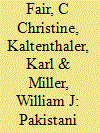

|
|
|
|
|
| Publication |
2014.
|
| Summary/Abstract |
America's Employment of Weaponized Unmanned Aerial Vehicles (Uavs), Popularly Known as "drones," to kill alleged terrorists in Pakistan's federally administered tribal areas (FATA) fuels sustained controversy in Pakistan. Pakistani outrage has steadily deepened since 2008, when the United States increased the frequency of the strikes.1 The increasing use of "signature strikes" has been particularly controversial in (and beyond) Pakistan, because such strikes are targeted at "men believed to be militants associated with terrorist groups, but whose identities aren't always known."2 Whereas personality strikes require the operator to develop a high level of certainty about the target's identity and location, based on multiple sources such as "imagery, cell phone intercepts and informants on the ground,"3 operators may "initiate a signature strike after observing certain patterns of behavior."4 When conducting signature strikes, the United States assesses that the individuals in question exhibit behaviors that match a pre-identified "signature" (for example, pattern of observable activities and/or personal networks) that suggests that they are associated with al Qaeda and/or the Pakistani or Afghan Taliban organizations.5 Because the identity of the target is unknown, even during the strike, it is possible that these persons are innocent civilians, a possibility that both current and former U.S. government officials concede.6 While the George W. Bush administration employed both personality strikes from 2004 and signature strikes from 2008 in Pakistan, the administration of Barack Obama has redoubled the use of both types.7 This has ignited public protests against the drones in Pakistan, particularly in Pakistan's urban areas-far removed from the tribal areas where drones are employed. It has also galvanized a vigorous debate within Pakistan's National Assembly, which tried, but ultimately failed, to curtail the strikes
|
|
|
|
|
|
|
|
|
|
|
|
|
|
|
|
| 5 |
ID:
126577
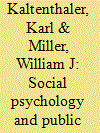

|
|
|
|
|
| Publication |
2013.
|
| Summary/Abstract |
This study argues that a central factor in the determinants of citizen attitudes toward trade is the social psychology of the individual in question. Namely, we contend that the level of social trust an individual has will condition the degree to which an individual wants to open her country to imports from other countries. Those individuals with lower relative levels of social trust are less likely to support the notion of freer trade. We base this contention on the logic that those people who are distrustful of people in general are more likely to distrust that which comes from people who are unknown to them, such as goods coming into their country from abroad. This argument is a departure from previous studies of public attitudes toward trade, which have focused on various economic utilitarian considerations and xenophobia that shape citizen attitudes toward trade liberalization. To test our argument, we employ data from the 1995-1997 wave of the World Values Survey. Using a logit regression analysis, we find, as predicted, that the more social trust an individual has, the more likely that person is to support the idea of liberalized trade.
|
|
|
|
|
|
|
|
|
|
|
|
|
|
|
|
| 6 |
ID:
098886
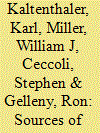

|
|
|
|
|
| Publication |
2010.
|
| Summary/Abstract |
This study is interested in understanding public opinion in Pakistan toward terror attacks. Specifically, this study explores (1) the general picture of attitudes in Pakistan toward terrorism and (2) which individuals are most likely to support terrorism in Pakistan. The study aims to give insights into how pervasive a support base exists for terrorism as a tactic in Pakistan and it seeks to isolate the individual-level traits that account for the variation we see among Pakistani Muslims regarding their level of acceptance of terrorism against Pakistani and Indian targets. The study finds that a large majority of Pakistanis oppose terrorism but terrorism directed at Indian targets is more tolerated than terrorism against Pakistani targets. The study also finds that those who are most supportive of Talibanization in Pakistan are the most supportive of terrorism.
|
|
|
|
|
|
|
|
|
|
|
|
|
|
|
|
|
|
|
|
|